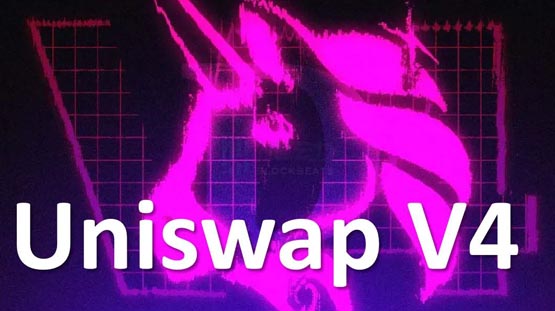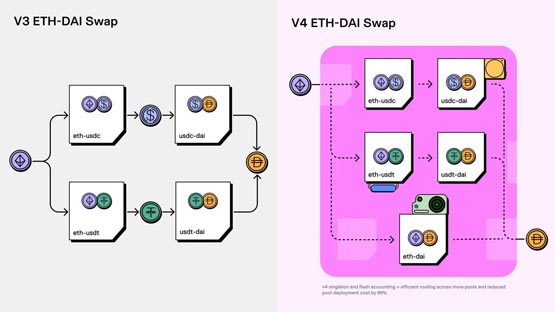
Uniswap, the leading decentralized exchange, announced late yesterday (15th) that the much-anticipated Uniswap v4 version is tentatively scheduled to be launched on the Ethereum mainnet in the third quarter of 2024.
According to the statement of Erin Koen, head of governance of the Uniswap Foundation, in July last year, the release of the v4 version will depend on the successful implementation of the Cancun upgrade. In addition, a comprehensive code audit is required, so the launch of v4 may be delayed to four months after the Cancun upgrade is completed.
The Ethereum Foundation recently announced that the Dencun upgrade plan is scheduled to be launched on the Ethereum mainnet on March 13, 2024. At the same time, the Uniswap Foundation also updated the launch date of v4 in a tweet on Thursday, which is expected to be in the third quarter of this year. The foundation also announced the audit roadmap before v4 goes online, which is expected to take several months. They expressed their belief that v4 will become one of the most rigorously audited codes on Ethereum.
Core code completion, testing, gas optimization, security enhancements, and finalization of minor parts.
Koen has previously stated that changes from Ethereum proposal EIP-1153 will be integrated into the v4 code during the "code freeze" phase. The key point of EIP-1153 is the introduction of a "temporary storage" system, which means that after the transaction is completed, the corresponding storage space will be cleared, thus helping to reduce gas costs.
In the software development process, "code freezing" is a stage in which the code of the protocol is fixed and no large-scale changes are made. This means that the development team stops adding new features or modifying existing features to the protocol to ensure the stability and reliability of the protocol. This stage is to ensure that subsequent stages of software development can better test, fix bugs and ultimately deploy the product. Through code freezing, the development team can focus on solving existing problems and ensuring the quality and stability of the code without being subject to frequent changes and interruptions. This helps reduce the risk of unexpected problems in subsequent stages and improves development efficiency
This time a comprehensive audit and social audit by multiple audit companies will be conducted Group audit competition. At the same time, v4 will be deployed to the testnet and final code adjustments will be made.
v4 is expected to be launched on the Ethereum mainnet in the third quarter
Uniswap Since v1~v3, after a series of important changes, it has gradually established its position as a pioneer in the field of automatic market makers (AMM) and the cornerstone of decentralized finance (DeFi). For example, v3, which will be launched in 2021, introduces the concept of "concentrated liquidity", allowing users to provide liquidity within a specific self-defined price range, allowing liquidity to be allocated more effectively and potentially improving capital efficiency.
The upcoming v4 version aims to provide a more customizable, flexible and efficient AMM. Among the high-profile technical reforms include: Hooks, singleton contracts ( Singleton Contract), Flash Accounting System (Flash Accounting).
Hooks
The main axis of Uniswap v4 is to shift towards a more modular trading structure, mainly through the introduction of "hooks" (hooks), which will allow liquidity pool deployers Custom code can be added to the liquidity pool, allowing users to execute functions such as dynamic fees, on-chain price limit orders, and custom on-chain oracles

Single contract ( Singleton Contract)
In v4, both the singleton contract and the lightning accounting system will help significantly reduce gas costs.
Originally in v3, each time a liquidity pool was established, a new contract needed to be deployed, which made it more expensive to create a pool and execute multi-pool Swap; while in v4, Uniswap saves all pools in one In the Singleton Contract, there is no need to transfer tokens between different contracts when exchanging tokens. Official research shows that v4 reduces the Gas cost of creating a mining pool by 99%.

Lightning Accounting System
v4’s Lightning Accounting System will help further reduce the gas cost of transactions, as the transfer will only occur when the Swap is completed The net balance of Tokens in the pool, and each operation in the process will only cause the internal balance to be updated, while v3 transfers all assets involved in the transaction into/out of the pool during the Swap process.
"Protocol Code Freeze" refers to a stage in the software development process where the protocol's code is fixed and stops making any large-scale changes. At this stage, the development team stops adding new features or modifying existing features to the protocol to ensure the stability and reliability of the protocol
The above is the detailed content of Ethereum Cancun upgrade will take several months to audit! Lightning accounting system. For more information, please follow other related articles on the PHP Chinese website!




